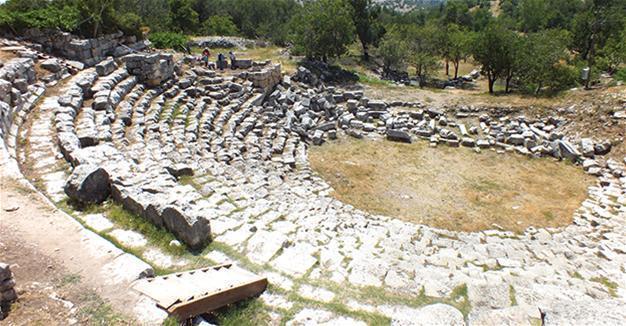Excavations start at Turkey's Uzuncaburç
 Archaeological excavations that have been initiated in the ancient city of Uzuncaburç in the southern province of Mersin’s Silifke district are expected to unearth important artifacts. Uzuncaburç is a significant tourism center in the city.
Archaeological excavations that have been initiated in the ancient city of Uzuncaburç in the southern province of Mersin’s Silifke district are expected to unearth important artifacts. Uzuncaburç is a significant tourism center in the city.Silifke district governor Şevket Cinbir has recently visited the excavation field with the Silifke Museum Director Nilgün Yılmazer. Silifke is a city which has been home to many different cultural heritage and values for 2,300 years, so it has a rich cultural heritage that many other countries do not have.
“We believe we will be able to activate our real tourism potential when our different values like castles and ancient cities in Silifke are presented. Of course, in addition to cultural heritage, Silifke also has natural beauties with its 115-kilometer Mediterranean coast, beautiful coves and islands in these coves. Our guests can swim in the sea, spend time on the beaches and visit our islands. Dana Island is the most important of these islands. It will become a museum island as well,” she said.
Yılmazer noted the museum has been continuing three excavations and four surface survey projects in the ancient city of Aydıncık (Kelenderis), Silifke Castle and the ancient city of Olba.
Ephesus of the eastern Mediterranean
Stating that about 20 drilling excavations and two rescue excavations were carried out this year, Yılmazer also said they had started the archaeological excavation preservation and restoration project in Uzuncaburç with the participation of Associate Professor Ümit Aydınoğlu of the archaeology department at Mersin University.
“Unfortunately, Uzuncaburç, which is one of the biggest ancient cities in the region, cannot get the value it deserves. We are now working on it. This project that continues under the leadership of university academics is very important in terms of tourism and archaeology as well as in terms of the region’s economy. Uzuncaburç has the characteristics of the world-known ancient city of Ephesus thanks to its archaeological ruins. It is our responsibility to revive and preserve Uzuncaburç and to make use of it for tourism,” said Yılmazer, who stressed that their goal is to revive the tourism potential in the historical site.
Yılmazer added that the excavations started in the theater section and they plan to continue working on the monumental fountain in order to rearrange the entrance of the ancient site.
















